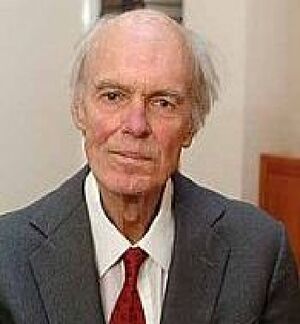Difference between revisions of "David Calcutt"
(unstub) |
m (Text replacement - "/Department of " to "/Department/") |
||
| Line 14: | Line 14: | ||
In 1973, he prosecuted Maureen Bingham, the wife of the naval officer who had passed secrets to the Russians. She received two-and-a-half years and Sir David, in the court of appeal, successfully argued that contacting a member of the Soviet Embassy was a sufficient preliminary step in the venture to justify her conviction.<ref>https://www.gresham.ac.uk/professors-and-speakers/professor-sir-david-calcutt-qc</ref> | In 1973, he prosecuted Maureen Bingham, the wife of the naval officer who had passed secrets to the Russians. She received two-and-a-half years and Sir David, in the court of appeal, successfully argued that contacting a member of the Soviet Embassy was a sufficient preliminary step in the venture to justify her conviction.<ref>https://www.gresham.ac.uk/professors-and-speakers/professor-sir-david-calcutt-qc</ref> | ||
| − | From 1974 to 1977, Calcutt had been an inspector for the [[UK/Department | + | From 1974 to 1977, Calcutt had been an inspector for the [[UK/Department/Trade|Department of Trade]] into the [[Cornhill Consolidated property crash]], and over the next twenty years he headed numerous inquiry boards. He was chairman of the takeover panel, and also the home secretary's independent assessor on compensation for miscarriages of justice, awarding nearly £1m to [[Paddy Hill]] of the [[Birmingham Six]]. |
Calcutt was known throughout the 1980s and 1990s for preparing reports and inquiries into various areas of public life. he was asked to produce a report on a fire in the [[Falkland Islands]] in which eight people died, then soon afterwards to produce a report into the [[Cyprus Seven Trial|Cyprus Seven]] spy affair, in which seven servicemen were acquitted of having passed secrets to the Russians. He is most famous for suggesting the creation of the Press Complaints Commission in 1990, though he was later quite scathing about it describing it as "a body set up by the industry, dominated by, and operating to a code of practice devised by the industry and which is over-favourable to the industry".<ref>https://www.thetimes.co.uk/article/sir-david-calcutt-b6jzsvwk8qj </ref> | Calcutt was known throughout the 1980s and 1990s for preparing reports and inquiries into various areas of public life. he was asked to produce a report on a fire in the [[Falkland Islands]] in which eight people died, then soon afterwards to produce a report into the [[Cyprus Seven Trial|Cyprus Seven]] spy affair, in which seven servicemen were acquitted of having passed secrets to the Russians. He is most famous for suggesting the creation of the Press Complaints Commission in 1990, though he was later quite scathing about it describing it as "a body set up by the industry, dominated by, and operating to a code of practice devised by the industry and which is over-favourable to the industry".<ref>https://www.thetimes.co.uk/article/sir-david-calcutt-b6jzsvwk8qj </ref> | ||
Latest revision as of 20:03, 20 December 2021
(lawyer) | |
|---|---|
 | |
| Born | 2 November 1930 |
| Died | 11 August 2004 (Age 73) |
| Alma mater | Cranleigh School, University of Cambridge/King's College |
Responsible for the creation of the UK Press Complaints Commission. | |
Sir David Charles Calcutt was an eminent barrister and public servant, knighted in 1991.[1] He was the Master of Magdalene College, Cambridge from 1985-94. He was also responsible for the creation of the Press Complaints Commission.
A chorister in the choir of Christ Church Cathedral, Oxford he attended Christ Church Cathedral School and then went on to Cranleigh School, [2] then King's College at the University of Cambridge.
In 1973, he prosecuted Maureen Bingham, the wife of the naval officer who had passed secrets to the Russians. She received two-and-a-half years and Sir David, in the court of appeal, successfully argued that contacting a member of the Soviet Embassy was a sufficient preliminary step in the venture to justify her conviction.[3]
From 1974 to 1977, Calcutt had been an inspector for the Department of Trade into the Cornhill Consolidated property crash, and over the next twenty years he headed numerous inquiry boards. He was chairman of the takeover panel, and also the home secretary's independent assessor on compensation for miscarriages of justice, awarding nearly £1m to Paddy Hill of the Birmingham Six.
Calcutt was known throughout the 1980s and 1990s for preparing reports and inquiries into various areas of public life. he was asked to produce a report on a fire in the Falkland Islands in which eight people died, then soon afterwards to produce a report into the Cyprus Seven spy affair, in which seven servicemen were acquitted of having passed secrets to the Russians. He is most famous for suggesting the creation of the Press Complaints Commission in 1990, though he was later quite scathing about it describing it as "a body set up by the industry, dominated by, and operating to a code of practice devised by the industry and which is over-favourable to the industry".[4]
He was married to Barbara, a psychiatric worker, in 1969, and in later life, he developed Parkinson's disease, but he remained "cheerful and genial".[5]
References
- ↑ https://www.theguardian.com/media/2004/aug/17/guardianobituaries.pressandpublishing Sir David Calcutt profile
- ↑ https://www.newspapers.com/clip/36057203%7Cdate=17 June 1990
- ↑ https://www.gresham.ac.uk/professors-and-speakers/professor-sir-david-calcutt-qc
- ↑ https://www.thetimes.co.uk/article/sir-david-calcutt-b6jzsvwk8qj
- ↑ https://www.telegraph.co.uk/news/obituaries/1469476/Sir-David-Calcutt.html |